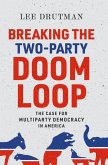The phenomenal growth of minority populations in the South, particularly Latinos and Asians, is quickly transforming the region's politics. Some argue that demography is destiny, and yet the analyses presented in The Changing Political South demonstrate little such certainty about the future competitiveness of the two major parties in the South. This volume substantiates the strong and persistent Democratic leanings of Black voters and a majority of women, yet it finds that the rising minority populations' votes are increasingly "up for grabs" by the two major parties. How the two parties fare in the future of Southern politics will be driven largely by their abilities to reach these new voters.








